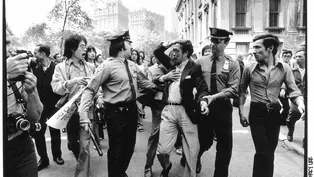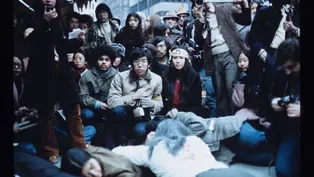
Corky Lee’s Life, Legacy, and Quest for Photographic Justice
Clip: 5/13/2024 | 3m 2sVideo has Closed Captions
The importance of the life, art, and activism of Chinese American photographer Corky Lee.
A tribute to 50 amazing years of Asian American Pacific Islander culture and activism through the lens of photographer Corky Lee. From Chinatown garment workers, Pakistani families, Thai dancers, Tibetan monks, Filipinos against war, feminists supporting the ERA, Koreans protesting hate crimes, and veterans remembering 9/11, Lee’s rare photographs show the diversity of the AAPI experience.

Corky Lee’s Life, Legacy, and Quest for Photographic Justice
Clip: 5/13/2024 | 3m 2sVideo has Closed Captions
A tribute to 50 amazing years of Asian American Pacific Islander culture and activism through the lens of photographer Corky Lee. From Chinatown garment workers, Pakistani families, Thai dancers, Tibetan monks, Filipinos against war, feminists supporting the ERA, Koreans protesting hate crimes, and veterans remembering 9/11, Lee’s rare photographs show the diversity of the AAPI experience.
How to Watch Photographic Justice: The Corky Lee Story
Photographic Justice: The Corky Lee Story is available to stream on pbs.org and the free PBS App, available on iPhone, Apple TV, Android TV, Android smartphones, Amazon Fire TV, Amazon Fire Tablet, Roku, Samsung Smart TV, and Vizio.
Providing Support for PBS.org
Learn Moreabout PBS online sponsorship(gentle music) (camera clicking) - [Commenter] Corky is one of the main documentarians of the Asian American movement.
Social movements are so hard to capture and to put onto paper or put onto film.
This is a story that hasn't really been told.
- [Commenter] The collection he has is a testament of our history, and that's why it's very, very important.
- With all these events, and who do you see?
You see Corky Lee (chuckling) taking pictures.
- It isn't an Asian Pacific American event if Corky Lee isn't around.
- He was doing the work he was doing literally for decades before he started garnering any kind of acclaim.
He did because it needed to be done.
(gentle music) - His photography is beautiful.
It's really making art and politics come together in a way that very few other photographers have been able to do.
- I was amazed just to see the diversity of photographs he had from so many communities.
Who else do you know that does this?
(gentle music) - [Commenter] We exchanged business cards, and I saw the "Undisputed, Unofficial Asian American Photographer Laureate."
I just never heard of one!
- I don't think anybody truly knows who Corky Lee is.
I think they see him in demonstrations with a camera, they see that he is constantly there.
And because of his constancy, he's almost invisible.
- [Commenter] Even though he collected all these photographs, that's not his full-time job.
Where does he get the energy to do all this, year in, year out?
(gentle music) - Corky made a commitment to document this Asian American experience decades ago.
So why would this pandemic, Coronavirus, stop him?
So you know, he continued his worked.
(gentle music) - [Commenter] Did it require sacrifice?
Yes, undeniably it did.
- [Commenter] His work remind us, there's something bigger than ourself.
(gentle music) - I take photographs that I think matter.
Specifically it has to do with Asian Pacific Americans.
That's something that the average American does not see.
(gentle music) And hopefully it opens a dialogue about our place in America.
(gentle music) I don't think people need to remember, you know, who I am.
It's more important that they remember the images.
(camera clickings) In all my photographs, I'm trying to include pages that should be in American history books that have been omitted.
(dramatic music) I'm practicing photographic justice.
(camera click)
Chinatown Rises Up to Unite Against Police Brutality
Video has Closed Captions
Lee’s iconic photo put a protest against police brutality on the front page of the Post. (1m 38s)
Documenting the Asian American Movement
Video has Closed Captions
Corky Lee’s rare images of the Asian American Movement on the East Coast in the 1970s. (1m 2s)
Providing Support for PBS.org
Learn Moreabout PBS online sponsorship












